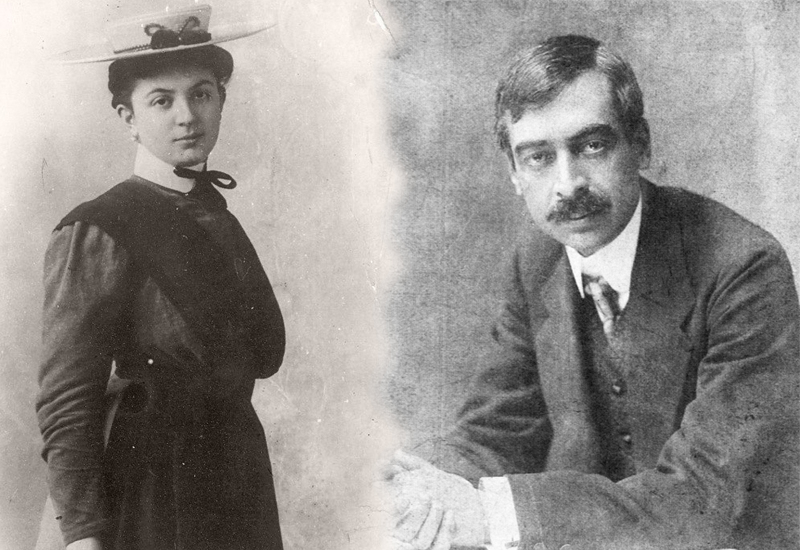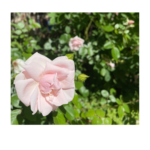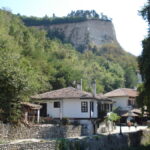You will be in white
By Peyo Javorov
Translated by Lubomira Kourteva
You will be in white – with an olive branch
and like an angel you will be in a white dress…
And I think today: the world is not rotten
because you are in it, it’s your home.
So there! I have finally doubted and dismissed
all my wicked disbeliefs – and I want peace.
And faithfully I’ll open my arms,
gazing into your loving eyes,
and I will drink their rays quietly, –
I will drink light, the healing sips.
And enlightened I’ll turn around again
to see the world whole and as a bright day.
And let it be ruined if it must!
(For I have stumbled upon ruins many times before,
lost amidst the midnight darkness)
I know I will find even then
little pieces and debris, from which I would create
a new world for both of us, our world, our temple.
Ще бъдеш в бяло
Пейо Яворов
и като ангел в бяло облекло…
А мисля днес; в света прогнил от зло
не е, щом той е твоята родина.
И ето усъмних се най-подир
в невярата тревожна – искам мир.
И с вяра ще разкрия аз прегръдки,
загледан в две залюбени очи,
и тих ще пия техните лъчи, –
ще пия светлина, лечебни глътки.
И пак ще се обърна просветлен
света да видя цял при ярък ден.
И нека съсипни се той окаже!
(Веднъж ли съм се спъвал в съсипни,
залутан из среднощни тъмнини?)
Аз бих намерил и тогава даже
обломки, от които да създам
нов свят за двама ни, и свят, и храм.
About {poetry translations}:
Many, many, years ago my grandparents gifted me a beautiful book, the historical novel “The Iron Candlestick” by Dimitar Talev (“Железният Светилник” от Димитър Талев), which is one of the most treasured gems in Bulgarian literature. On the inside of the book they had written me a dedication: “To Lubomira, with so much love and deep respect, with the hope that no matter where she finds herself in this beautiful world, her love for her home land and her heritage will never burn out.”
And here I am. Still burning. Still, never forgetting. My heart is too big.
{poetry translations} is my new series in which I will delve into the hard task of translating poetry. As this year is coming to a close, many people say “let go of the old to take it the new”. And sure, we need to de-clutter, always. But it is just as important to stay close to our roots, remembering those who came before us; those who paved our way, as the land today is the one we borrow from the future generations also. I believe that old and new can dance together, weave together, and hold each other’s hands. I believe knowing our roots, knowing history, is a devotion to never forget, so that truly new things can unfold. This is why I dedicate part of Art of Love to retelling old stories and lore in my series The Story Threads.
Having lived across three continents, I’ve not only been blessed to experience new cultures and traditions, but I’ve also seen how new worlds open when we speak another language. Just by learning a new word, a new world opens, a new experience is felt through our body. And we also open up new worlds for others to experience, when we can gift the gift of translating works made of love.
While all literary works are hard to translate, poetry certainly takes the crown as the hardest one. It not only requires the translator to understand the depth and essence of the poem, but then they have to allow the “other” language to carry its meaning forward. Words while they could be literally translated, don’t necessarily carry the same meanings. And in many ways, I feel that translations are a work of artists, a way of dancing with, and in-between, worlds, re-shaping words while allowing the thread of love to carry forth the essence and meaning of the poem’s heart. Hopefully, I’ll do these older poets and poetesses the justice they deserve, and hopefully, for you, my dear reader, I can open up another world, of touching the heart of foreign words.
About the poem and the author:
Peyo Javorov (Пейо Яворов) (1878-1914) was one of the most beloved and brilliant Bulgarian poets. He was recognized internationally, and the Yavorov Peak on Livingston Island in Antarctica is actually named after him. Even today, he is still considered to be one of the finest poetic talents in all of Bulgarian history.
Javorov’s poetry is romantic, beautiful, emotional, and one that people can’t help but fall in love with. Equal parts tender and brooding, with deep sensitivity and sentimentality, his poetry grabs you by the throat, and heart, and demands your full attention, with a sacred intimacy.
Javorov was part of the Symbolist movement, weaving natural imagery and metaphors to express the universal and the spiritual, tackling themes of love, trust, purity, temptation, faith and predestination. In its essence, symbolism, as described in the Symbolist Manifesto (“Le Symbolism”) by Green poet and essayist Jean Moreas, sets out to “clothe the Ideal in a perceptible form” and to reject “plain meanings, declamations, false sentimentality and matter-of-fact descriptions.”
This is particularly true of Javorov’s sublime love poetry, as it marries the physical with the spiritual, and the sacred; as the lover’s beauty, and the intimacy of the bond that the two of them share, transcends the love to a realm and a world, from a time before time beyond time. There is fatedness. There is soul connection. There is ethereal depth, meaning and beauty.

Mina Todorova and Peyo Javorov
You will be in white…
I am completely in love with this poem.
The love so beautifully expressed here is sacred, is tender, is true. The continuous presence of the colour white symbolizes the purity, tenderness and innocence that arises within us when we are in love. When we are touched by love, true love, an air wraps around us of such beauty and such sacredness, that we become in our highest expression. It is believed, or so it is written in ancient mystic texts, that in the angelic realms, angels, or higher beings of consciousness, can’t even pronounce a word or a sound, unless they love it. If they don’t love apples, they won’t say nor understand apples. This is why – their language is the language of love. And when as humans, mere mortals, fall in love, we speak of love, we become angels here on earth, and here on earth, becomes heaven. For heaven is found within. And love opens its doors.
In the poem we can clearly see that he is not an ignorant man nor is he an immature boy full of idealism inspired from inexperience. He has walked through ruins, he has known deep pain and devastation and loneliness. He has lost faith, many times before. He has felt tormented and lost, walking through the darkness of the soul. And he has learned – how to piece together himself, from debris.
Through the love he feels for his beloved, he has found his faith again. And loving her, even if from a distance, just the thought of her, brings his soul peace. This is what love does to us. We feel peace in our souls and in our hearts. We feel find harmony, joy and calmness.
Love is God’s gift to us.
Our beloved is a seed for the divine.
And through the power of love, which is the strongest power of them all, the lyrical self will enlighten its own spiritual horizon. In the poem, the awe of love, the skin’s tremble from love, is expressed as a spiritual experience.
Indeed it is. In true love, all divisions dissolve and we come into oneness. Two paths of two souls merge. Two hearts beat as one.
The seeming boundaries of the physical are no longer relevant. The joy of one is the joy of the other, the tears of one are as if felt on the face of the other. Duality ceases to exist. The soul frees itself from disbelief and worries and doubts and fears, and it creates the temple of inner harmony.
We see all of these spiritual concepts beautifully expressed in the poem: the temple, the sacredness, the vows, the promise of a togetherness, the references to a wedding made long before two souls met on earth.
In the poem, Javorov’s beloved is not just a woman, a love, a lover, an enchantress, an angel, a divine being. She is everything. She is a spiritual temple. She is “the” temple. She is the spiritual refuge to his soul, his solace, his home. She gives him light, warmth and peace.
No matter what he goes through, how lost he is, or will be, her tenderness, beauty and light gently guide him and save him. She doesn’t let go of his hand, like an angel or a northern star, and she continues to hold a space of hope and a positive vision for him even he has lost sight. She rebuilds in him the ability the trust and believe. There is soul-soothing and even in his darkest days, and the thought of her is like sipping healing light. In a way, she is his pulse, his heartbeat, the meaning of all, the reason for all and for everything.
And in there temple, in the sacredness of love that they share, there, they will always meet and be together.
And who was this woman who inspired him, and this beautiful poem?
A Sacred Love: Mina Todorova and Peyo Javorov
Mina Todorova was one of his greatest inspirations, and thought to have been his one big love, though the poet later on married and dedicated many poems to his wife Lora Karavelova also. He actually met both Lora and Mina around the same time in 1906. Undoubtedly though, he dedicated himself to romance only Mina. He was so God-smacked in love with her at first sight, smitten with her innocence, beauty and tenderness, that as soon as he came home after first seeing her, he wrote the poem “Annunciation” (“Благовещение”):
“A cool breeze from angel’s wing, Oh angel, Oh child, zephyr from angel’s wing across the heat of my forehead, as if I fall into a gentle dream … and the dawn is dawning outside the window.”
Romantic as he was, Javorov was charming her with many handwritten letters, in which he always referred to her as “angel”. Skeptical at first, Mina wrote in one of her replies, “I can’t make sense of what will come out of this. I am so young, and you are a poet.” He didn’t give up though, and step by step, Mina began to fall in love with him also.
They continued their long distance correspondence for the next three years, and their love grew stronger and stronger. But Mina’s parents disapproved of the relationship and so their love remained secret, and most probably, remained in the realms of the emotional, spiritual and non-physical. Though this didn’t make it any less passionate, and the fires were burning powerfully for both of their bodies.
In June 1909, they saw each other for the last time, and then, they promised to meet again despite family’s disapproval and all other challenges in two years time, when they will be together forever. Tragically, Mina fell ill with tuberculosis shortly after; her family sent her to Paris for treatment. Desperate to meet her, the poet travelled to France to see her, but her family once again forbade him. Mina passed away in July 1910. Javorov was completely devastated. For six months after, every day, he’d visit her grave and stay there. It is said that he never got over her loss, and that she remained his one true love.

Peyo Javorov's handwriting, from his diaries
Poems like “You will be in white”, “Two Lovely eyes” (“Две хубави очи”), and “Enchantress” (“Вълшебница”) portray the sacred, divine love that he felt for Mina, and how he always wanted to share his entire life with her, as her husband. While many of his other poems can sometimes take more sensual and darker undertones inspired by his wife Lora, Mina remains his one muse, inspiring the pure expressions of Godly love, creating so much tenderness, gentleness and beauty in his poetry.
In one of his diaries, Javorov wrote:
“And in those two beautiful eyes, I had sung a song. And I had put a ring on her tender little hand. And our lips merged into one kiss, one kiss which was our vow, our oath.
(…) This was the day of the Annunciation. And I called her my God’s gift for this life.”
Javorov often shared in his diaries that the feelings he felt were just too big and strong for poetry, and that he should perhaps experiment with other genres. I can only imagine if he had written a novel, as beautiful as his diaries, how it would have stolen my heart. I think for all of us writers, we should always stay curious and try to experiment with other genres, to allow more freedom of expression, for the soul to shape its way as it needs, through our hands.
To Javorov, Mina was his soulmate.
Of course, there were other loves. Perhaps many others, as some people say. But Mina is Mina, only Mina. There is no need to compare with other women, and his other muses and inspirations.
After her death, the poet stops writing poetry. And I understand that, for I too can’t write anything if I am sad – everything seems so meaningless. He writes only one poem as a goodbye to her, “Innocent and holy – orchid, in stellar solitude … Go, dream, go to her, – go there all thousands of dreams! And may in her embrace the bravest of you all become her guardian angel, protecting her. And there – humble nuns with bowing eyes – worship days and years amidst incense and dreams. Go, dream – dreams, carry snow and lilies in your hands … The poppy’s bloody colours remain in my heart!” The poem is heartbreaking yet beautiful but he never publishes it, and it remains in the privacy of the poet’s diaries. It finally finds light twenty years after Javorov’s death when it is published by Mihail Arnaudov in 1934.
As I write all of this, I think of our world and current affairs. I think it is easy for us to somehow to lose sight of the good in life, and with that skewed vision, stress and negativity absorbed along the way, to allow that to influence our inter-personal relationships. It is easy to forget what even beauty looks like. And I think the reason why we have forgotten is perhaps because we don’t see it, or we fail to notice it. We have to surround ourselves with more love, more beauty, more tenderness. We have to remind our eyes what beauty looks like, feels like. We have to build love, contain love, emit love. This is how meaningful change happens. We have to remember what sacred is also – what it looks like, what it feels like, what it inspires in us. When we discover it, or rather rediscover it, and more importantly – when we remember it – I believe we will be kinder, more compassionate, more attentive and caring, and thus see more beauty, more love and more light. Because it is all still here. There is still goodness, still beauty, so much of it.
With love + gratitude,

Love poetry?
This was part of my {poem + story} series where I share new poems, inspirations and art. You can also read poems from my two full-length poetry books in my poetry section, and learn more about my books, Moonhold (2019) and The God-like Things (2021). Both are available for purchase, signed copies upon request.
You can also read my essay on “The Power of Poetry” published in The Poetry Question Journal, on the connection between poetry and mysticism.
And if you’ve missed it, you can read my other two {poetry translations} Enchantress by Peyo Javorov, Two lovely eyes by Peyo Javorov, and Pagan Love by Dora Gabe.
If you are a Bulgarian poet/writer wanting your work translated by me, you’re absolutely welcome to contact me.
I love what I do, I love to create and to contribute, and if you want to support me and my work of love (and my upcoming new book of poetry!), you can do so by sharing my articles and poems, buy my books, or donate some magic coins in my hat on Paypal. If you would like to work with me, hire me or collaborate, feel free to check out my Offerings or contact me directly.
Your support means so much to me! Thank you wholeheartedly!




